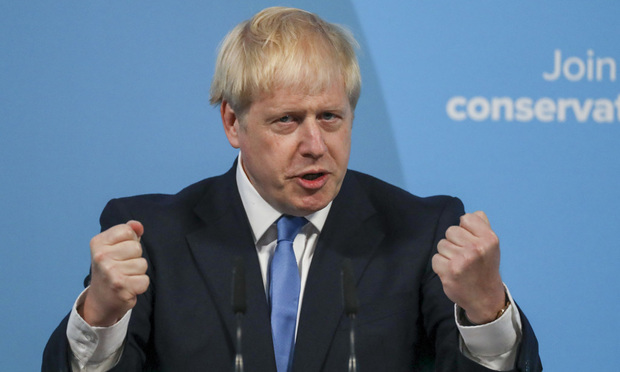Lawyers Share Their Biggest No-Deal Brexit Fears
"The consequences for any firm that is not prepared for the worst could be quite severe," says one lawyer, as industry figures reveal their worst-case Brexit scenarios.
August 29, 2019 at 09:15 AM
6 minute read
 Boris Johnson asked The Queen for permission to suspend Parliament, as a no-deal outcome looms large.
Boris Johnson asked The Queen for permission to suspend Parliament, as a no-deal outcome looms large.
A no-deal Brexit could result in a range of problems for law firms including inter-office rifts, investigations by foreign regulators and increased costs for clients, according to leading industry figures.
Law.com affiliate Legal Week spoke with leading lawyers about what the worst-case Brexit scenario could be for top law firms if the U.K. crashes out of the EU without agreeing terms — a prospect made more likely after Prime Minister Boris Johnson asked the Queen on Wednesday to suspend Parliament, limiting its ability to debate or prevent a hard exit.
Many pointed to people issues as the most immediate challenge.
"Lawyers across borders try their honest best to set the politics aside, but they are still people."
Clifford Chance banking and finance partner Simon Gleeson said that, "if the politics get nasty" and the relationship between the U.K. and the E.U. turned into a "cultural cold war", that could be mirrored at firm level.
"Lawyers across borders try their honest best to set the politics aside", he said, "but they are still people."
He added that EU lawyers who once seriously considered joining U.K. law firms may no longer view them as "an attractive prospect".
"You just never know when you might be, well, asked to leave."
A Brussels-based partner at a top U.S firm added that the risks inherent in joining a U.K.-based firm would "heighten". He added: "You just never know when you might be, well, asked to leave. It's a hazy transition period in which anything could happen, and I'm not sure I'd want to work under those circumstances."
The lawyer went on to suggest that non-U.K. lawyers might prove "a risk" for some law firms, as "their [immigration] status will perennially be under suspicion", adding that the situation was "awful" and "unpredictable".
Others argued that partnerships would be forced to cooperate more closely in the event of a hard divorce but admitted that could have knock-on consequences.
Philippe Ruttley, a consultant solicitor at Keystone law, emphasised that while there will be animosity between the blocks, and "very little patience with British arrogance in Brussels", it could mean
However, he added that w
Ups and downs
The broad consensus among commentators is that a no-deal scenario will create a transactional work dip, and a concurrent regulatory work spike.
Norton Rose Fulbright partner Jonathan Herbst suggested that, "if regulation becomes a political football, it would make things more difficult" for both lawyers and their clients, arguing that additional, more complex tariffs could slow, if not completely frustrate, deals.
"The demand for regulatory advice will go through the roof."
Conversely, Gleeson explained that "the demand for regulatory advice will go through the roof, and more money will be spent on lawyering rather than on transactions".
This sentiment was echoed by Miriam Gonzalez-Durante of Cohen & Gresser, while Ashurst disputes partner Lynn Dunne added it could also open doors for litigators as clients rush to abandon riskier deals.
Dunne also suggested that economic uncertainty often creates fertile ground for fraudsters, which generally translates to work for white-collar crime and regulatory lawyers.
But lawyers may also require advice themselves regarding the issue of legal professional privilege.
British lawyers currently benefit from an EU-wide privilege which ensures that communications between lawyers and their clients are protected from the prying eyes of external investigations in criminal or civil matters.
"Under EU rules, legal privilege is only applicable to EU-qualified lawyers – with the exception of in-house lawyers," Ruttley explained. However, British lawyers who are not qualified and practicing in an EU member state will no longer have that protection come the Brexit deadline on October 31, Ruttley explained.
Cross-border confusion
"The consequences for any firm that is not prepared for the worst could be quite severe."
With many U.K. lawyers taking up citizenship in Brussels and becoming Irish qualified, the threat of having one's qualifications called into question is too great for some, particularly those working in the competition and antitrust world.
Andrew Hood, a partner at Fieldfisher and a former adviser to former Prime Minister David Cameron, warned: "The consequences for any firm that is not prepared for the worst could be quite severe."
He added: "Those in the service industry – like lawyers – need to understand whether there will be any new limits on their ability to sell into the EU or provide services in the EU.
"The legal sector will face challenges and uncertainty around the recognition of qualifications and the ability to represent clients across borders and in the courts of the EU."
Keystone's Ruttley added that "not being in the EU means that U.K. lawyers will no longer have the right of audience in EU courts where they are not admitted" which, in his view, would "cut out a lot of the very good and experienced British barristers and solicitors" from practising in Europe.
"The real losers are the clients."
The Brussels-based partner added that, while solicitors have a big problem, "the real losers are the clients" in a no-deal scenario, adding that "Boris has piled yet more bullsh*t upon the no-deal catastrophe".
He says: "Clients are already facing uncertainty from other quarters of the market, the threat of supply chains collapsing, of an influx of unchecked materials. Now add to that the fact that their regular legal advisers may no longer be able to provide advice to them. What an absolute mess."
This content has been archived. It is available through our partners, LexisNexis® and Bloomberg Law.
To view this content, please continue to their sites.
Not a Lexis Subscriber?
Subscribe Now
Not a Bloomberg Law Subscriber?
Subscribe Now
NOT FOR REPRINT
© 2025 ALM Global, LLC, All Rights Reserved. Request academic re-use from www.copyright.com. All other uses, submit a request to [email protected]. For more information visit Asset & Logo Licensing.
You Might Like
View All
Chicago Law Requiring Women, Minority Ownership Stake in Casinos Is Unconstitutional, New Suit Claims
5 minute read
Free Microsoft Browser Extension Is Costing Content Creators, Class Action Claims
3 minute read
Fired by Trump, EEOC's First Blind GC Lands at Nonprofit Targeting Abuses of Power
3 minute read
Indian Law Firm Cyril Amarchand Rolls Out AI Strategy, Adopts Suite of AI Tools
Trending Stories
- 1Public Notices/Calendars
- 2Wednesday Newspaper
- 3Decision of the Day: Qui Tam Relators Do Not Plausibly Claim Firm Avoided Tax Obligations Through Visa Applications, Circuit Finds
- 4Judicial Ethics Opinion 24-116
- 5Big Law Firms Sheppard Mullin, Morgan Lewis and Baker Botts Add Partners in Houston
Who Got The Work
J. Brugh Lower of Gibbons has entered an appearance for industrial equipment supplier Devco Corporation in a pending trademark infringement lawsuit. The suit, accusing the defendant of selling knock-off Graco products, was filed Dec. 18 in New Jersey District Court by Rivkin Radler on behalf of Graco Inc. and Graco Minnesota. The case, assigned to U.S. District Judge Zahid N. Quraishi, is 3:24-cv-11294, Graco Inc. et al v. Devco Corporation.
Who Got The Work
Rebecca Maller-Stein and Kent A. Yalowitz of Arnold & Porter Kaye Scholer have entered their appearances for Hanaco Venture Capital and its executives, Lior Prosor and David Frankel, in a pending securities lawsuit. The action, filed on Dec. 24 in New York Southern District Court by Zell, Aron & Co. on behalf of Goldeneye Advisors, accuses the defendants of negligently and fraudulently managing the plaintiff's $1 million investment. The case, assigned to U.S. District Judge Vernon S. Broderick, is 1:24-cv-09918, Goldeneye Advisors, LLC v. Hanaco Venture Capital, Ltd. et al.
Who Got The Work
Attorneys from A&O Shearman has stepped in as defense counsel for Toronto-Dominion Bank and other defendants in a pending securities class action. The suit, filed Dec. 11 in New York Southern District Court by Bleichmar Fonti & Auld, accuses the defendants of concealing the bank's 'pervasive' deficiencies in regards to its compliance with the Bank Secrecy Act and the quality of its anti-money laundering controls. The case, assigned to U.S. District Judge Arun Subramanian, is 1:24-cv-09445, Gonzalez v. The Toronto-Dominion Bank et al.
Who Got The Work
Crown Castle International, a Pennsylvania company providing shared communications infrastructure, has turned to Luke D. Wolf of Gordon Rees Scully Mansukhani to fend off a pending breach-of-contract lawsuit. The court action, filed Nov. 25 in Michigan Eastern District Court by Hooper Hathaway PC on behalf of The Town Residences LLC, accuses Crown Castle of failing to transfer approximately $30,000 in utility payments from T-Mobile in breach of a roof-top lease and assignment agreement. The case, assigned to U.S. District Judge Susan K. Declercq, is 2:24-cv-13131, The Town Residences LLC v. T-Mobile US, Inc. et al.
Who Got The Work
Wilfred P. Coronato and Daniel M. Schwartz of McCarter & English have stepped in as defense counsel to Electrolux Home Products Inc. in a pending product liability lawsuit. The court action, filed Nov. 26 in New York Eastern District Court by Poulos Lopiccolo PC and Nagel Rice LLP on behalf of David Stern, alleges that the defendant's refrigerators’ drawers and shelving repeatedly break and fall apart within months after purchase. The case, assigned to U.S. District Judge Joan M. Azrack, is 2:24-cv-08204, Stern v. Electrolux Home Products, Inc.
Featured Firms
Law Offices of Gary Martin Hays & Associates, P.C.
(470) 294-1674
Law Offices of Mark E. Salomone
(857) 444-6468
Smith & Hassler
(713) 739-1250








